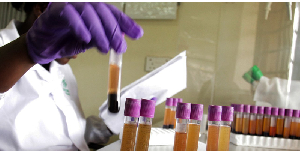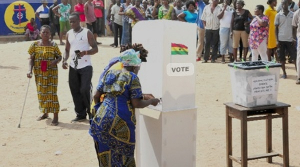- Home - News
- TWI News | TV
- Polls
- Year In Review
- News Archive
- Crime & Punishment
- Politics
- Regional
- Editorial
- Health
- Ghanaians Abroad
- Tabloid
- Africa
- Religion
- Election 2020
- Coronavirus
- News Videos | TV
- Photo Archives
- News Headlines
- Press Release
Business News of Wednesday, 22 April 2009
Source: financial intelligence (charles k. amoah)
Ghana’s challenges to persist through second quarter
Economic experts predict that Ghanaians would have to bear with another difficult quarter, saying the country’s current economic challenges would likely travel deep into the second quarter of the year.
In a review of the current economic situation in the country, analysts at Databank indicate that the most frightening economic issue to Ghanaian businesses and individuals, the sharp depreciation in the local cedi, would continue into the second quarter of the year after losing ground against all its three major trading partners during the first quarter of 2009. “We expect the depreciation of the cedi to remain severe during the second quarter. This would be mainly facilitated by further deterioration in the country’s external accounts and high import demand”, a report from the research unit noted”.
They further pointed out that the country would have to endure a number of economic challenges through the remaining months of the year as a result of the global economic meltdown and the transitional blues that still hit the local markets.
“Weak export earnings, high inflation and a decline in service sector growth pushed Ghana’s GDP growth below the 7% target set by government to 6.2% in 2008. We expect output growth to further contract to 5.9% in 2009 on account of weaker exports and foreign direct investment, they stated.
According to Databank, elections in December, 2008 combined with the global food and energy price hikes had resulted in the severe fiscal slippage in 2008, which was about 14.9% of GDP compared to 8.1% in 2007.
They noted that the country’s sovereign rating was downgraded to B+ (negative outlook) on account of mounting public debt and external vulnerability. They expressed the opinion that the country’s rating could improve significantly in the medium term if government remain commited to its decision to reduce fiscal deficit to 9.4%, and improve on domestic food production to curtail import growth. On the issue of inflation, they stated that consumer inflation increased from the 18.1% in December, 2008 to 20.5% in March 2009, driven mainly by the depreciation of the cedi and strong domestic consumer demand. Interest rates edged up during the quarter and were consistent with excessive government borrowing. This, they said, induced an increase in the Bank of Ghana’s prime rate to 18.5% in February 2009.
On the local stock market, research analyst at Databank acknowledged that the Ghanaian market experienced intensifying corrections in the first quarter of the year, which along with the sharp decline of the cedi/USD yielded a 24% fall in the market index for the period.
“Market capitalization edged downwards by 14% to US$12.6 million. Liquidity on the bourse improved in light of the profit taking by investors”, they said. The group indicated that despite the commencement of full automated trading on the GSE, a number of teething problems may initially slow down activity on the bourse, adding that, “ this is likely to stall price movements and market volume recorded”.
With a number of listed companies maintaining strong fundamentals as evidenced in impressive earning numbers posted by most companies especially the banks and distribution companies, the group expects profit taking to slow down. They point out that in his first 100 days in office, President John Evans Atta Mills has reiterated the need for economic stability as well as an adherence to human rights and good governance, with the priority areas remaining a reduction in the budget deficit, exchange rate stability and inflation in the single digits. The transition from the erstwhile NPP government to the ruling NDC though plagued with allegations, has been smooth and provides useful lessons for subsequent transitions, they said, adding that the threat of an upheaval in the conflict situation in the North of the country remains the only challenge at the political front. “We maintain a stable outlook on Ghana’s political front for the next quarter”, they said.
The report pointed out that, should the economic situation further worsen, it could result in “an upsurge in strikes, protests and dissents”. An attempt to hear from the Research Department of the Bank of Ghana (BoG) concerning the state of affairs in the country’s economy was not rewarded as the unit indicated it was too early to get a full report on the first quarter of the year. An official of the department however gave the assurance that the Monetary Policy Committee would meet by the end of this month to analyse available data for the first quarter, after which other useful projections for the remaining months in the year could be made.










